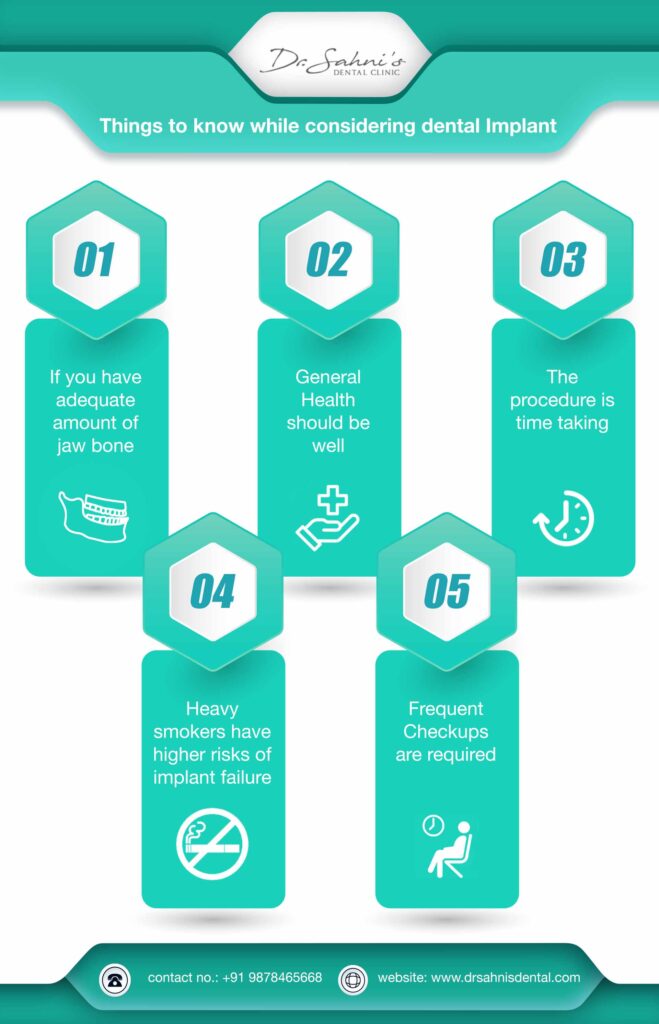Dental implants, in general, are extremely safe and also have a high success rate. However, reports and statistics suggest that 5-10% of dental impacts fail and there are a plethora of reasons that could facilitate that. Moreover, it is possible for the dental implant failure symptoms to pop up within a few months after the surgery or even within a year or two.
In case you are planning on undergoing the procedure and want to avoid dental implant failure reasons, we hope this article gives you all the insights that you need to know.
Table of Contents :-
Feel free to skip ahead if one topic catches your eye
- Common Signs of Dental Implant Failure.
- Reasons why Dental Implants Fail.
- How to Prevent Implant Failure?
- Take Away
1. Common Signs of Dental Implant Failure :-
The dental implant failure may be evident in the early stages after the surgery or it may come up as a long-term complication. Whenever it may be, you need to keep a check on the symptoms to get immediate help to correct the issue.
Some of the common signs of dental implant failure treatment include:-
Sharp Pain and Discomfort – Experiencing pain, swelling, and discomfort after a dental implant procedure is common, especially because it is an intense dental treatment. You might experience the pain lingering even for the first few days after the surgery. Dentists generally prescribe medication for such temporary complications. However, if these temporary side effects persist and the pain becomes excruciating and prolonged, it is time to see your dentist.
Difficulty While Chewing – The primary purpose of a dental implant is to restore your lost tooth/teeth to help you chew and bite your food better. If you continue facing issues with eating or chewing, it is a sign of a dental implant failure.
Gum Recession Around The Implant – This is a very rare symptom and affects a few patients that have undergone the treatment. The primary reasons that can cause gum recession include improper placement of the implants or weak gums and jawbones. Sometimes, the angulation procedure is also not done properly which can contribute to gum recession.
Persistent Swollen Gums – As mentioned before, swelling around the gums and implants is common a few days after getting the implants. But, if the condition persists and doesn’t get better over time with medication and cold compress, it is a sign of treatment failure.
Loose Implant – This one doesn’t need any explanations at all. If your implant isn’t fitted well into your jawbone and is loose, it is a sign that you need to get it checked again.
2. Reasons Why Dental Implants Fail :-
There are several factors that contribute to dental implant failure reasons. Some of the primary ones are:
Smoking – If the patient is an avid smoker, they will likely impose the risks of delayed healing of the gums after the procedure. Smoking restricts the blood flow to the gums, preventing the gums to recover on time following the treatment. Even studies have pointed out that smoking enhances the risks of failure by 20%.
Weaker Jaw Bone – The dental implants are placed into the jawbone and it is the dentist’s duty to ensure that the patient has enough jawbone structure to accommodate the implants without any risks. If there is a lacking presence of a healthy bone structure around the jaw, it will contribute to the failure.
Gum Disease – One of the most prevalent causes behind dental implant failure is gum disease. The persistent infection, if left untreated can affect that implant, delay healing or impose further complications.
Chronic Medical Conditions – if you are struggling with chronic diseases like autoimmune diseases or if you are on medications that cause bone loss, there are higher risks of implant failure in them. So, make sure that you get a thorough examination before undergoing the procedure and provide every information about your medical history.
Teeth Grinding – This is one of the long-term dental implant failure reasons, and occurs in patients who have a habit of clenching teeth. The symptom starts off with dull pain and swelling around the implant, followed by excessive pressure on the teeth that is imposed by the implants. It inflicts pain in the long term and makes it difficult to eat food.
Allergic Reactions – Another rare symptom of dental implant failure is allergic reactions. If the patient’s body reacts to the titanium implants, they will experience signs of infections followed by loss of taste and prolonged swelling.
Inexperienced and Unqualified Surgeon – Dental implant surgery is a crucial and important one. So, if you are planning on getting it done, always seek out experienced dentists who specialize in this kind of surgery. Opting for a random doctor with no specialized experience can result in failure.

3. How To Prevent Implant Failure?
While some of the dental implant failure reasons are avoidable, others are not. However, there are a few measures for preventing dental implant failure that the patient can adapt to for a successful surgery and recovery:
- Start by focusing on the initial recovery after the surgery by taking care of your general health and taking the prescribed medications.
- Avoid unnecessary habits like smoking and alcohol, which contribute to the risks of failure.
- Be cautious about your oral health hygiene and prevent the risks of gum diseases by brushing, flossing, and gargling, whenever needed.
- Increase your calcium intake on a daily basis to support your bone health.
- Consult your dentist about mouth guard if you are experiencing teeth grinding.
- Always consult an experienced dentist with years of experience and reliability in this field.
How To Treat Failed Dental Implant Surgery?
If you are experiencing any of the above mentioned dental implant failure symptoms, it is important that you don’t take it lightly and consult a doctor immediately. Once you consult your dentist, they will assess the damage and then suggest the subjective treatment plan that you need to undergo to correct the symptoms of the failure.
Generally, if there are signs of infection and inflamed tissues around the implants, the dentist will first remove the abscess before suggesting further alternatives.
Take Away
Just because dental implant failures occur sometimes, doesn’t mean that it is not a successful procedure or one that you should consider. Knowing about these risks help you prepare in the best way for the treatment. So, before you consider undergoing the treatment, rule out all the possibilities of the risks to ensure a successful recovery for yourself.
At Dr. Sahni, you will get the best treatment from board-certified dentists and under optimal care with minimal risks of dental implant failures.
